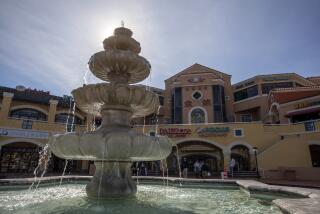Birthplace of Economic Reform Mourns Father of Its Fortune
- Share via
SHENZHEN, China — Emblazoned on a giant billboard above a cacophonous intersection here, Chinese senior leader Deng Xiaoping beholds this glittering city where his economic miracle began. His expression is almost beatific, the satisfied gaze of a creator, and so it is natural that the billboard suddenly has become an impromptu shrine.
While most Shenzhen residents went to work and play as usual the day after Deng’s death in Beijing, tens of thousands found time Thursday to lay handwritten banners and bouquets of yellow chrysanthemums on the steps beneath his portrait.
“Without Deng Xiaoping, there would be no modern China. There would be no Shenzhen,” said Wang Weiling, 29, a textile factory worker who had been holding a vigil in front of the picture since dawn.
Thousands of people had come since morning to huddle with others before the billboard. Some said they came because they were moved, though not shocked, by Deng’s long-awaited death, and many more simply saw the crowd and joined it.
“I feel a strong sense of being lost,” said Yan Wuhai, 27, a computer technician from central China, after he placed a small clutch of handpicked flowers between two towering arrangements. “I don’t know what to do next.”
Shenzhen, which burst from a tiny fishing village to become a metropolis of 4 million after Deng anointed it a special economic zone in 1980, is one of the places that feels his death most keenly, as it owes its expansion to his reforms.
This is the birthplace of China’s first experiments with a market economy, its first stock market, and it now is the home of China’s richest citizens per capita--the average income being about $200 a month.
It was with Shenzhen in mind that China’s senior leader uttered: “To get rich is glorious.”
It was here that he declared: “Our steps should go faster; our courage should be greater” to jump-start the growth that has made China a global economic power.
Deng meant for Shenzhen and three other original special economic zones to “get rich first” and pull the rest of China along.
Now there are seven such zones drawing millions of peasants from provinces across China to share the wealth and send it home.
Shenzhen, though, has done particularly well: Since 1980, exports here have grown on average more than 50% a year, and the city’s foreign trade, almost all of which goes through Hong Kong just across the border, made up 15% of China’s total in 1995.
So it is natural that Deng still finds special favor in this commercial city. Here, people do not want to dwell on the 1989 Tiananmen Square crackdown in Beijing, which occurred under Deng’s charge and which taints the hagiography of the “paramount leader.”
“Now is not the time to talk about that,” art salesman Chiang Min said of Deng’s repressive side, especially as evidenced at Tiananmen Square. “And besides, it was very far away.”
Still, Shenzhen’s current mix of entrepreneurs and speculators, migrant workers and gangsters, just may be as subversive as the protesters whom Deng suppressed in Tiananmen Square. That’s because these individuals in Shenzhen are quietly slipping beyond the reach of government limits.
“I’m a free man here,” said one man from Hunan province. “I have my own business, and there are no controls on me.”
Deng had warned of this in his 1984 trip to Shenzhen.
“If you want to open the window,” he said then, “you can’t help but have a few flies and mosquitoes come in.”
Indeed, troubles have even flown up near the late senior leader himself.
On his second visit here during the famed 1992 “southern tour” designed to fend off Communist critics of the enterprise zones, Deng visited a laser disc factory. It was said to be partly owned by a relative of a senior Chinese leader; the site was later identified by the U.S. government as a place where copyright piracy was occurring.
Deng, in his visit here, also then stopped by Shougang Steel, a company headed by Zhou Guanwu, who had close family ties to the senior Chinese leader. Zhou was forced to step down from his job in 1995, as the courts sentenced his son Zhou Beifang to death in connection with “commercial crimes” committed while boss of Shougang holdings in Hong Kong.
The incidents involving Shougang and Zhou, many analysts said, were a demonstration of just how Deng’s protective powers had faded.
Indeed, as he faded from the scene in the past few years, Shenzhen itself has come under attack. Conservatives, upset by its large numbers of corrupt officials--100 were arrested in a 1995 purge--also argue that its special economic privileges are causing inland provinces to lag behind. Property speculation and a saturated labor market have slowed Shenzhen’s growth.
And now that Deng and his implied clout are gone, Shenzhen’s freewheeling entrepreneurs fear the central government may try now to rein the zone in.
“The government set limits on gains and losses at the stock market recently,” a local investor said. “It seems like we’re going backward.”
More to Read
Sign up for Essential California
The most important California stories and recommendations in your inbox every morning.
You may occasionally receive promotional content from the Los Angeles Times.













